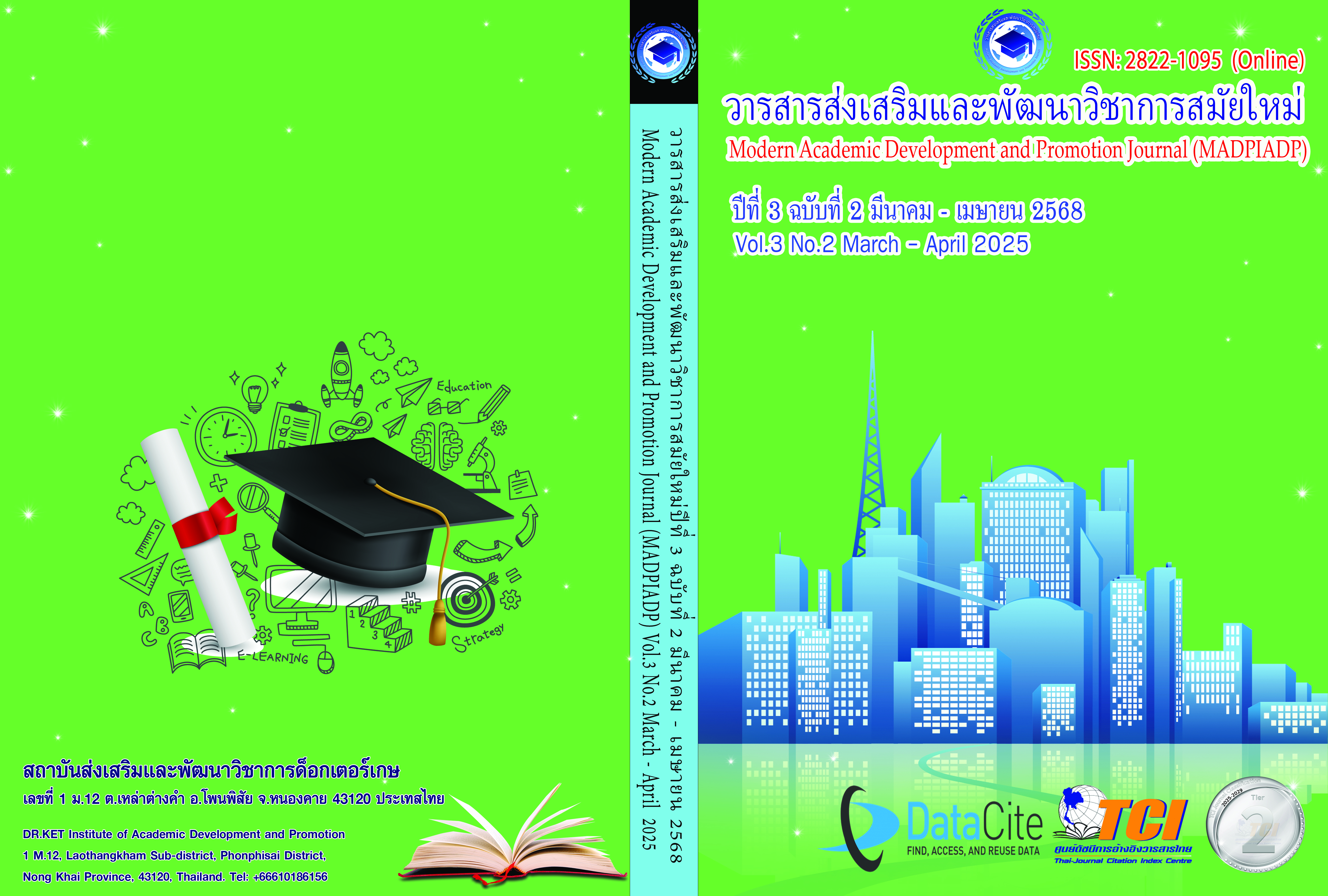THAILAND AND KOREAN CROSS-CULTURAL COMMUNICATIONS IN USING SOFT-POWER ETHICS
Main Article Content
บทคัดย่อ
In the era of globalization, soft power has become a vital tool for developing countries to build international relationships and cultivate alliances. This research conducts a qualitative secondary analysis comparing the core soft power strategies utilized by South Korea and Thailand in their nation-rebranding efforts and cultural diplomacy initiatives. It also examines the fundamental principles, customs, and cultural exports emphasized in each country's soft power approach.
The study evaluates the successes and limitations of both strategies through international public opinion polls and global soft power rankings. It further explores how each country tailors its messaging and outreach based on target audiences. The findings reveal that both nations rely on popular media and creative content to enhance international appeal. South Korea emphasizes contemporary pop culture, such as K-dramas and K-pop, to project a modern and dynamic image, whereas Thailand highlights traditional arts and performances to showcase its timeless cultural heritage. Korea adopts a branding strategy cantered on innovation and youthfulness, while Thailand’s approach focuses on hospitality and spiritual harmony. These insights offer valuable implications for scholars and practitioners working on soft power strategies.
Article Details
เอกสารอ้างอิง
Ahn, Y., & Lim, S. (2023). Role of cultural public diplomacy in enhancing foreign policy. Korea Observer, 54(4).
Athique, A. (2019). Soft power, culture and modernity: Responses to Bollywood films in Thailand and the Philippines. International Communication Gazette, 81(5), 470–489. https://doi.org/10.1177/1748048518802234
Balraj, B. M., & Abd Manan, M. H. (2022). The conception of soft power in Korean’s popular culture. International Journal of Academic Research in Business & Social Sciences, 12(9), 1909–1921. https://doi.org/10.6007/IJARBSS/v12-i9/14826
Barden, J. (2019). A superpower between superpowers: How post-Cold War South Korea leveraged pop culture into soft power (Doctoral dissertation). [University Name not specified].
Bazyar, M., Yazdi-Feyzabadi, V., Rashidian, A., & Behzadi, A. (2021). The experiences of merging health insurance funds in South Korea, Turkey, Thailand, and Indonesia: A cross-country comparative study. International Journal for Equity in Health, 20, Article 182. https://doi.org/10.1186/s12939-021-01535-7
Carminati, D. (2020). Playing safe or taking risks? Comparing China and Japan's soft power strategies in Thailand. Asian Politics & Policy, 12(3), 316–336. https://doi.org/10.1111/aspp.12497
Costa, G. M. S. (2023). Soft power and country image: A study about the influence of South Korean popular culture on consumer behaviour (Doctoral dissertation). [University Name not specified].
Jang, K. (2019). Between soft power and propaganda: The Korean military drama Descendants of the Sun. Journal of War & Culture Studies, 12(1), 24–36. https://doi.org/10.1080/17526272.2018.1517601
Kim, M. (2022). The growth of South Korean soft power and its geopolitical implications. Journal of Indo-Pacific Affairs. [No volume/issue/page available]
Kim, Y. (Ed.). (2021). The soft power of the Korean Wave: Parasite, BTS and drama. Routledge.
______. (2022). Soft power and cultural nationalism: Globalization of the Korean Wave. In Y. Kim (Ed.), Media in Asia: Global, digital, gendered and mobile (pp. [insert pages]). Routledge. [Page numbers missing]
Kruarattikan, S. (2023). Taiwan’s soft power in the perceptions of the Thai elites. In Taiwan and Southeast Asia: Soft power and hard truths facing China's ascendancy (pp. 171–190). [Publisher missing]
Lamichhane, M. R. (2020). Promotion of soft power through cultural diplomacy: A study of Nepal (Doctoral dissertation). Department of International Relation & Diplomacy. [University name missing]
Lee, K. S. (2018). Entitled to benevolence? South Korea’s government-sponsored volunteers as public diplomacy and development actors. In Communicating national image through development and diplomacy: The politics of foreign aid (pp. 123–141). [Publisher missing]
Lee, S. T. (2022). Film as cultural diplomacy: South Korea’s nation branding through Parasite (2019). Place Branding and Public Diplomacy, 18(2), 93–104. https://doi.org/10.1057/s41254-021-00212-4
Lipscomb, A. (2019). Culinary relations: Gastrodiplomacy in Thailand, South Korea, and Taiwan. The Yale Review of International Studies, 1(1), 1–3.
Lovric, B. (2018). From film stories to national soft power: Policies and film content of South Korea, Japan, and China. In A. K. Chan & N. T. Khoo (Eds.), The Palgrave handbook of Asian cinema (pp. 609–630). Palgrave Macmillan UK. https://doi.org/10.1007/978-3-319-97157-7_27
Ma, H. (2021). The comparative study of US-China soft power diplomacy to ASEAN [Unpublished doctoral dissertation]. [University Name not specified]
Mustafha, N., & Abdul Razak, F. H. (2020). Cultural diplomacy in Korean drama Descendants of the Sun. Journal of Media and Information Warfare, 13(1), 1–49.
Praditsilp, W., & Pongsakornrungsilp, S. (2023). Thai dance diplomacy: Thai government communication strategies for building soft power through staging Thai performances abroad. The Journal of International Communication.https://doi.org/10.1080/13216597.2023.2214339
Praditsilp, W. (2022). Crafting soft power in Thailand (Doctoral dissertation). Macquarie University.
Pumalee, M. T., Maluleem, J., & Faheem, M. (2018). Soft power engagement toward ASEAN under the India’s Act East Policy after 2014: A case study of Thailand (Doctoral dissertation). Thammasat University.
Roongsangjun, T. (2023). Soft power and the development of Thai society. Journal of Social Work, 31(1), 89–117.
Steane, N. (2020). Examining the role of the human factor as a non-state actor in South Korea’s public diplomacy strategies in Uzbekistan. [Source details incomplete – consider omitting or clarifying]
Tella, O. (2021). Africa's soft power: Philosophies, political values, foreign policies and cultural exports. Taylor & Francis.
Trisanawadee, S. (2020). Chinese cultural diplomacy towards ASEAN countries: Case study of Confucius Institutes in Thailand. Manutsayasat Wichakan, 27(2), 416–450.
Yoon, S. W., & Zamorano, M. M. (2023). EU–South Korea international cultural relations in the twenty-first century: An overview. Asia Europe Journal. https://doi.org/10.1007/s10308-023-00675-y
Zhou, Y. (2021). Confucius Institute in the Sino–Thai relations: A display of China's soft power. Asian Journal of Social Science, 49(4), 234–243. https://doi.org/10.1163/15685314-bja10036


